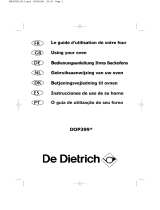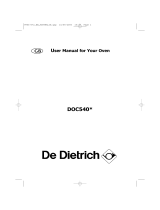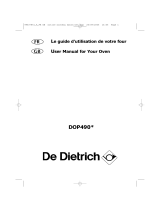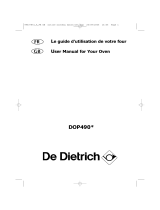GB
Accessories
Rear
Front
Curved anti-tipping safety grid
Its shape was designed to allow you to position
your dish between two shelf support levels.
Dish + grid (drip tray)
Inserted under the grid, it catches barbecue
juices and grease. It can also be used half-full
of water for double-boiler cooling methods.
Avoid placing roasts or meats directly in the
dish because you are certain to have major
spattering on the oven walls
Multi-purpose dish (drip tray)
It is used to collect juices and grease from cook-
ing with the high grill or the pulsed grill. It can be
used as a cooking dish when suitable for the size
of the item to be cooked (e.g. whole poultry sur-
rounded with vegetables, at moderate tempera-
ture). Inserted under the grid, it catches barbe-
cue juices and grease. It can also be used half-
full of water for double-boiler cooking methods.
Rotisserie
• Position the spit support in the notches of the drip
tray dish (see drawing).
• Place the assembly in the oven on the second wire shelf
support (from the bottom). After placing the piece of
meat to be roasted on the rotisserie, place the spit on the
support piece, sliding the whole until the tip of the spit is
inside the motor located at the back of the oven. Remove
the handle by unscrewing it. After cooking, remove the
entire assembly. At the end of the handle, a grip allows
you to unscrew the forks.
Non-stick baking tray
(to be placed on a grid)
Placed on the dish support grid, it can be used for
cooking pastries, pies and pizza.
Its non-stick coating ensures easy removal of
baked items.
Wear oven mitts to protect your hands when
removing it from the oven. Let it cool before
washing it by hand in the kitchen sink with dish soap. Avoid using scouring sponges.
WARNING: Do not cut on it with a knife or a metallic pizza cutter; use plastic or sil-
icone utensils instead.
Do not use the tray at temperatures above 250°C or during the PYROLYSIS mode.
35


























